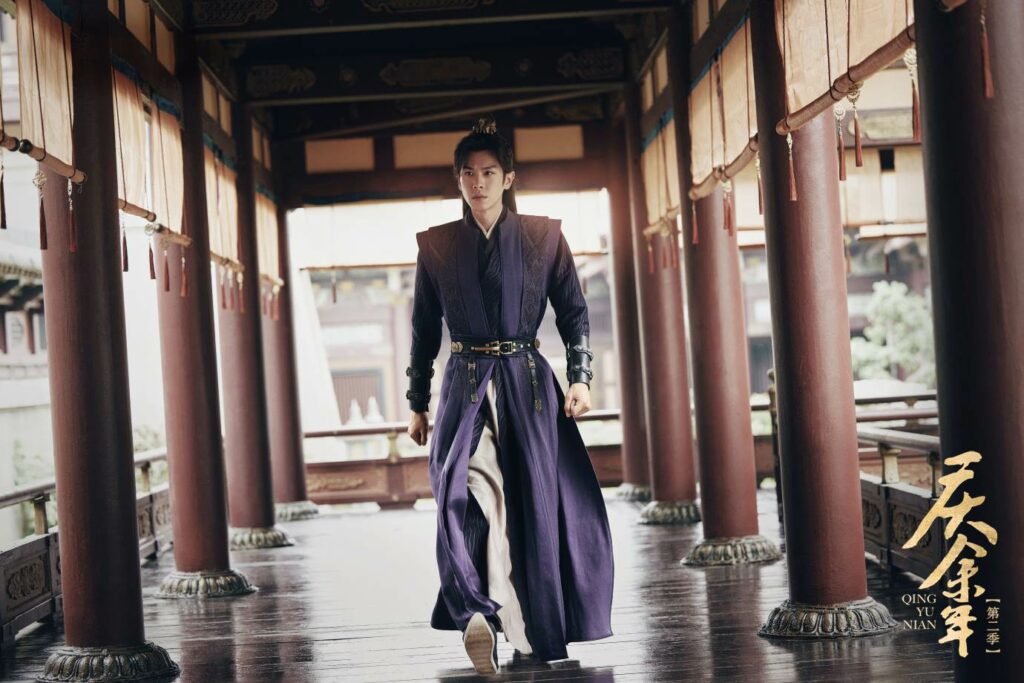Season 1 – Ep 37
The Qi Emperor is portrayed by a woman. No, this is not a “pants” role where a woman takes the role of a man. There is a whole subplot around the Qi Emperor much later in the book. In the book, it’s easier to hide that the Emperor is a woman because the author doesn’t have to describe the features of the Emperor. In a drama, it’s much harder because well, we have to visually see this person, although the costume designer and makeup artists do a better job than most period dramas in making the Emperor seem androgynous to hide the fact that the Emperor is in fact a woman. In further descriptions of the Emperor for this season, we’ll refer to the Emperor as he because that’s how the Emperor is shown to the world.
Next is the difference between Fan Gong Zi, Fan Xian, and Fan Da Ren. In the drama, the Emperor does not call Fan Xian as Official Fan but instead uses a more personable term of Fan Gong Zi. Gong Zi roughly translates to Young Master or Mr and is more commonly used amongst cordial peers or women referring to men. This becomes a source of headache for Shen Zhong and Wang Qi Nian because they don’t know WHY the Emperor is calling Fan Xian in such a non proper way as this elevates Fan Xian as if they’re peers rather than a ruler and envoy relationship. If you hear when the Emperor is only with Hai Tang Duo Duo and Fan Xian. The Emperor begins calling Fan Xian by his name rather than even Fan Gong Zi. The Emperor can do that as he is of higher rank. The Qing Emperor calls Fan Xian by his name too so that’s not uncommon. Fan Gong Zi is the sticky point that muddies the authority of the Qi Emperor.
Second, let’s discuss the few lines that the Qi Emperor recites. 拍栏杆,林花吹鬓山风寒,浩歌惊得浮云散
The original poem is as such: 殿前欢·登江山第一楼
拍阑(lán)干。雾花吹鬓(bìn)海风寒。浩歌惊得浮云散。细数青山,指蓬莱(lái)一望间。纱巾岸,鹤背骑来惯。举头长啸,直上天坛。
Here’s my translation – leaning against the railing, the powerful and damp sea breeze, carrying mist-like moisture, rushes forward, making my hair flutter in the wind. I sing aloud, my voice soaring to the heavens, surprising the drifting clouds to scatter. As I carefully count the verdant mountaintops, the immortal land of Penglai seems just within reach. With a scarf, I drift through the clouds like the ancient immortal Wang Qiao, lifting my head to the sky to let out a long, resounding cry, ascending straight to the celestial altar.
The title of 殿前欢·登江山第一楼 translates roughly to the Dian Qian Huan tune – written in the 多景Tower in the 甘露 Temple which is situated in current Jiang Su province and was once known as the Top tower in Mount Jiang
The original poem was written by the Yuan dynasty poet 乔吉 who lived from 1280-1345 AD. He was also a dramatist who specialized in love stories and marriage stories. This also meant composing tunes. Unfortunately, during his lifetime, he was not well celebrated and lived an impoverished life, having to travel far and wide to make a living. There are a few of his works that survive. I couldn’t tell if the music still survived but the scripts of his plays and stories did. It is unknown when the author wrote the poem. He traveled significantly and most likely didn’t write this poem about the tower, just reflecting his thoughts while there.
In the drama and the book, the Emperor quotes 拍栏杆,林花吹鬓山风寒,浩歌惊得浮云散 instead of 拍阑(lán)干。雾花吹鬓(bìn)海风寒。浩歌惊得浮云散. There’s a slight difference in the first 4 words. The Emperor states 栏杆 which is specially a guard railing but the original poem has 阑(lán)干. It sounds the same but this was an ancient form of railing, typically using wood or bamboo. The 4th word is 林 or forest instead of 雾 mist. So this isn’t a straight quote but close enough.
Lastly – there are two lines in the episode one spoken by the Qi Emperor and one spoken by Fan Xian that sound like formal poems but aren’t. 一夜诗尽天下文 and 乡间村妇怠懒时 there’s fall under the style of 七言诗 or the seven character verse. The author wrote these lines and are easy enough to understand.
一夜诗尽天下文 – in one night, all the poems of the world have been written
乡间村妇怠懒时 – when a rural village woman is lazy
Book differences:
Fan Xian doesn’t get assaulted during the route into the palace but instead, the people of the Qi Kingdom show their outward disdain towards the Qing envoy. In their mind, they view the people of the Qing Kingdom as savages. As for the war, the royal family didn’t even inform the wider public that there was a war or that they lost! Therefore Fan Xian doesn’t encounter 何道人 at this point in time. The palace officials are more curious of Fan Xian rather than hostile. Moving on to the palace, in the book it is also noted just how lavish and extravagant the palace is of the Qi Kingdom. The Qi Emperor is also quick to refer to Fan Xian as Fan Gong Zi instead of Fan Da Ren or Fan Qin for a more proper reference. I thought the drama made the Qi Emperor a little too amiable. In the book, at first the Emperor seemed to be a regular late teen who was interested in Fan Xian’s talent but the Emperor quickly reveals WHY he is still the Emperor. He has a gravitas that Fan Xian immediately notices when his demeanor changes. We don’t really see that here in the drama. The drama pulls forward the faction battle between the Emperor and the Empress Dowager which the book doesn’t get to until later.

